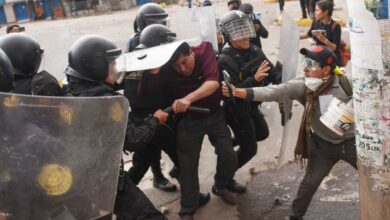What is so significant about the horrid death of Mina Daniel? What distinguishes him from previous martyrs Khaled Saeed or Sayed Bilal? Shouldn't this strange succession of names reveal something about the recent history of the Egyptian security apparatus and open up the possibility of reforming it to public debate? Despite the short period of time between these successive deaths, each name tells a different story about security's "monstrosity" and "failures." Each name has played a particular role in dismantling the legitimacy of the Egyptian security apparatus and will continue to be important in any discussion concerning its reform or complete restructuring.
These narratives of martyrdom allow us to glimpse into how the security apparatus had operated over the last thirty years and how it was capable of establishing some form of legitimacy for its actions. Each name has dealt a blow to the legitimacy of the security apparatus in its own right. The figure of Mina Daniel has the potential to accomplish two things. One is to uncompromisingly tie the Egyptian public to the slogan, "Bread, Freedom and Social Justice"– a reversal of all the values, ways of life and grim nostalgias under the Mubarak regime that take us beyond the current discussion of reforming the security forces. The other is to accept the current attempts of resurrecting the Mubarak regime – of which the brutal apparatus is only one part.
The angelic image of Khaled Saeed resonated with many young people in the Arab world, especially those of middle class background. Saeed's case proved that torture practices had proliferated to a monstrous degree. They were no longer limited to the margins (squatter areas and popular quarters, that is). Contrary to Saeed's case, the second martyr, Sayed Bilal, pushed the limits of social empathy by shedding light on the silenced history of torture practices in Egypt. Following the bombing of the Church of Two Saints in Alexandria, state security attempted to present a familiar figure, Bilal's suspicious Salafi background, to the national media. In Bilal's case, the security apparatus attempted to re-create the conditions of a sectarian crisis. In the name of such crises, the Mubarak regime knew only solutions based on security measures: mass detentions, confessions elicited under torture, indiscriminate threats of abuse of those closely related to the accused victims.
Let us now return to the original question: what distinguishes Mina Daniel from Khaled Saeed and Sayed Bilal? In my view, he pushed the limits of social empathy to the point of tearing. His enigmatic death exposed, all at once, the foundational narratives of the apparatus, all those narratives which formed the base of social legitimacy for the apparatus's practices in the last 30 years. In other words, Daniel's death tested the sensibility of the Egyptian public shedding light on crucial questions such as: how far is it willing to go concerning the apparatus' reform? How can the center of attention in these debates about reform shift from the apparatus itself as a “reformable” entity to the very ambiguous ways the term “thug” is being employed by both the apparatus and the national media?
In the eyes of the national media, Mina's body is brimming with contradictions. If we follow the apparatus' logic, everything about him evokes suspicion. He is a Copt yet he constituted a dissident voice inside the church. He inhabited the margins of the capital. In the eyes of the middle classes, he was one of those “uncivil” soccer ultras. In short, all of those “contradictions” summon the margins of his predecessors (Saeed and Bilal among others). How can someone carry all those contradictions and yet still move so lightly? What kind of claims or demands did he make? Can they be fulfilled easily?
Mina's death moves us beyond the current debates on the apparatus' reform in two decisive ways. On the one hand, protesters have discovered the limits of the language of reform and its exclusions. On more than one occasion, the ministry of interior and the military police have employed thugs to beat protesters and used the same charge of “thuggery” against them in military trials. Simply put, the apparatus paradoxically feeds on its own victims-transgressors.
On the other hand, Mina's case has proved that some form of vendetta is needed at times. In my view, the profundity of vendetta lies in the fact that its animosity cannot be satiated with the destruction of one person or one entity; it is ongoing and filial. In other words, vendetta does not limit us only to the reform or purification of the security apparatus but takes us to a confrontation with the very despicable values and ways of life nurtured by the Mubarak regime (of which the apparatus perhaps is only an off-shoot). The list of those values is long, stretching from indifference and cowardice to self-loathing and indecisiveness. It is in those terms that we can speak about the legacies of Danyal, Saeed or even Bouazizi.




